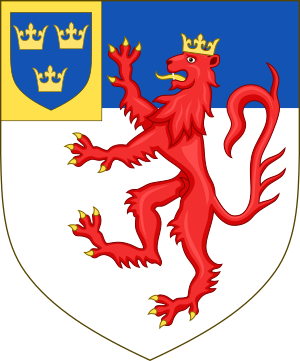Henry St George facts for kids
Quick facts for kids
Henry St George
|
|
|---|---|
| Born | 27 January 1581 Hatley St George, Cambridgeshire, England, United Kingdom
|
| Died | 5 November 1644 (aged 63) Brasenose College, Oxford, England, United Kingdom
|
| Occupation | Officer of arms Norroy King of Arms Garter Principal King of Arms |
| Spouse(s) | Mary Dayrell (c.1614-1644) |
| Children | Henry St George, the younger Thomas St George Frances St George |
| Parent(s) | Richard St George Elizabeth St John |
Sir Henry St George (1581–1644) was an important English officer of arms. An officer of arms, also called a herald, was a special official who helped with things like family histories, coats of arms, and important ceremonies. Henry was the third son of another famous herald, Sir Richard St George.
Contents
The Life of Sir Henry St George
Henry St George was born on January 27, 1581, in a place called Hatley St George in Cambridgeshire, England.
Starting His Career as a Herald
In 1610, Henry joined the College of Arms. This was the official place for heralds in England. He started as a "pursuivant-extraordinary," which was a junior role. The next year, he became a "Bluemantle Pursuivant." In this job, he traveled with his father to check on family histories and coats of arms in Derbyshire and Cheshire. These trips were called "heraldic visitations."
In 1614, Henry married Mary Dayrell. They had eleven children together. In 1616, he was promoted again to "Richmond Herald." He also helped another famous herald, William Camden, with more visitations between 1619 and 1623.
Important Missions and Knighthood
Henry took on some very important tasks. In 1625, he was sent to France. His job was to bring Queen Henrietta Maria to England. She was going to marry King Charles I.
Two years later, in 1627, Henry went to Sweden. He had a special mission to make King Gustavus Adolphus a Knight of the Garter. This was a very high honor given by the English king. While in Sweden, King Gustavus Adolphus knighted Henry. He also gave Henry a special addition to his own family's coat of arms. This addition showed the Swedish royal arms.
Becoming a King of Arms
Between 1633 and 1635, Henry helped his father with another visitation in London. After his father passed away, Henry was appointed "Norroy King of Arms." This was a very senior position in the College of Arms.
Later, during the English Civil War, Henry stayed with King Charles I in Oxford. In 1644, he was given the highest heraldic position: "Garter Principal King of Arms." This made him the chief herald in England.
Sir Henry St George died in Oxford on November 5, 1644. He was buried in Christ Church Cathedral.
Family Legacy
Henry's sons also followed in his footsteps. His son Thomas became Garter Principal King of Arms in 1686. Another son, Henry, became Garter in 1703. His son Richard became "Ulster King of Arms" in Ireland in 1660. This shows how important the St George family was in the world of heraldry.
What is a Coat of Arms?
 |
|
A coat of arms is a special design that represents a person, family, or organization. It's like a unique symbol or logo. Henry St George had his own coat of arms, which was similar to his father's.
His coat of arms featured a red lion standing on its hind legs, with a gold crown. It also had a blue band across the top. After his trip to Sweden, King Gustavus Adolphus gave him a special addition. This was a small gold square with three gold crowns on a blue background, representing Sweden.
Henry's family motto was Firmitas in Coelo, which means "Stability in Heaven."
 | Sharif Bey |
 | Hale Woodruff |
 | Richmond Barthé |
 | Purvis Young |

